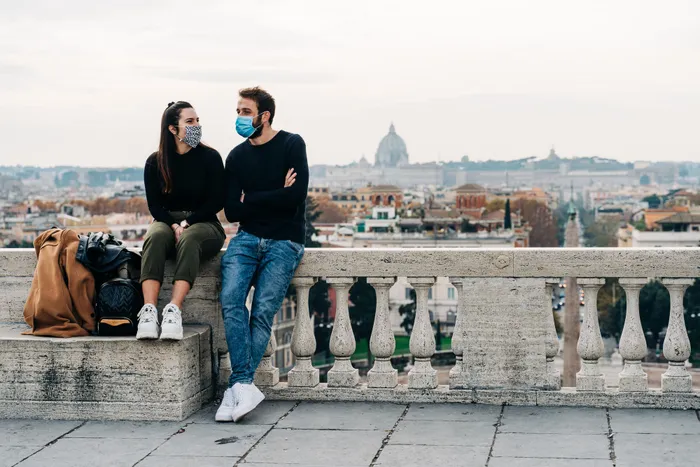How to savour travel like an Italian, from the woman who wrote a book on it

Whether that grandiose claim holds water is up for debate, but plenty of people sure seem to want to go to Italy. Picture: Unsplash
By Natalie B. Compton
THE INSPIRATION for Maria Pasquale’s latest book, “How to be an Italian,” came from a question that was (mostly) a joke: Doesn’t everybody want to be Italian?
Whether that grandiose claim holds water is up for debate, but plenty of people sure seem to want to go to Italy.
As travel trends emerge for 2022, Italy remains one of the most popular destinations in the world for Americans to visit, whether they’re honeymooning or on a budget. Expedia’s 2022 Travel Trends Report says Rome is the second-most-popular international destination for US travellers based on hotel searches; Hostelworld says Italy’s capital city is in the Top 10 most-booked cities for Americans this year.
The landscape, the history and the food are all reasons Italy boasts such enduring popularity for European vacations, but for Pasquale, the nation’s appeal all boils down to one point. “The Italian lifestyle is the country’s trademark,” Pasquale said in her book.
Pasquale, an Australian Italian author who has lived in Rome for more than a decade, knows it is impossible to fit Italy’s diverse essence into one neat box. “How to be an Italian” explores some of the defining features shared within the country’s national identity. That includes a peek at how Italians live, eat, drink and travel. We spoke with Pasquale about how to embody some of those elements on your next trip to Italy so you can enjoy it more like an Italian.


Slow down and embrace spontaneity
It’s natural to want to see as much as you can when you’re away from home. But, according to Pasquale, packed agendas and rigid schedules are decidedly not Italian. “Italians often think the tourist programme is kind of crazy,” Pasquale says. “If you’re going to seven cities, it’s just not perceived to be an ideal way to travel.” Instead of trying to see as much of Italy as you can, Pasquale says, it is the Italian way to savour simple pleasures at a slow pace. She recommends travellers focus on the mantra “less is more” by ditching to-do lists.
“Generally, I think [Italians are] more spontaneous in terms of travel,” she says. “It’s now a theme of pandemic travel, but last-minute has always been an Italian thing.”
Dress the part wherever you go
In a country where police uniforms have been designed by Armani, style is important. It’s not about flashing designer labels, “it’s more in how they carry themselves,” Pasquale says. “It’s that seemingly effortless way of putting an outfit together.”
One common fashion faux pas Pasquale sees tourists commit is wearing clothes that don’t match the occasion.
For example, Pasquale says, Italians are more inclined to wear a city outfit to the gym or beach and change into the appropriate attire when they get there. Before leaving, they will change back.
Pasquale points to the principle “la bella figura” to explain the routine. The expression literally translates to the beautiful figure, but “what it really means is making a good impression,” Pasquale says.
Drink, eat, repeat
In “How to be an Italian,” Pasquale waxes poetic on how tourists are routinely blown away by Italians’ relationship with food: their high-standards for it, their focus on the pleasure of eating.
“Quality and good food and that enjoyment of it is paramount to the Italian character and DNA,” she says.
Part of the process of savouring meals is having them at the right time and in the right order. Take dinner, for example. In America, dinner, on average, takes place around 6pm or 7pm. In Italy, those are prime aperitivo hours, when you would gather for a cocktail and some light snacks to prepare your stomach for dinner. Apertivo is not about getting hammered before dinner, which is a mistake Pasquale sees tourists make often.
Dinner in Italy happens at 8pm or later, starting with antipasti, followed by a primi first course (often pasta), a heavier secondi main course, potentially a salad course and then dessert.
“Once everything is said and done, then you order your coffee and then maybe you’ll order a digestivo or an amaro,” Pasquale says. “It’s all about the digestion process for Italians.”
That obsession with digestion explains a rule of the Italian diet: Pasquale says milk-heavy coffee drinks are consumed in the morning only, because an after-dinner cappuccino may unsettle your stomach after supper.
To tip like an Italian after your meal, don’t really tip. Pasquale says the practice is welcomed but not expected in Italy, and it is generally carried out by leaving a few coins on the table vs a percentage of your bill.
Pay extra for a day at the beach

For many Italians, particularly those in the south, summer means getting away to the beach.
While free beaches (la spiaggia libera) do exist, Pasquale says “doing the beach like an Italian is definitely going into a beach club, a stabilimento balneare or lido.”
Beach clubs offer customers a lounge chair, umbrella, showers, a bar and access to additional amenities depending on the establishment.
Whether you end up at a beach club or find a spot in the sand free of charge, break for a proper sit-down lunch. Once you are finished and head back to the water, you may notice it relatively empty after mealtime.
“You’ll probably see tourists in the water,” Pasquale says. “Italians do not go straight in the water after eating again. It blocks their digestion.”
This article first appeared in Sunday Insider, Feb 6, 2022
Related Topics: